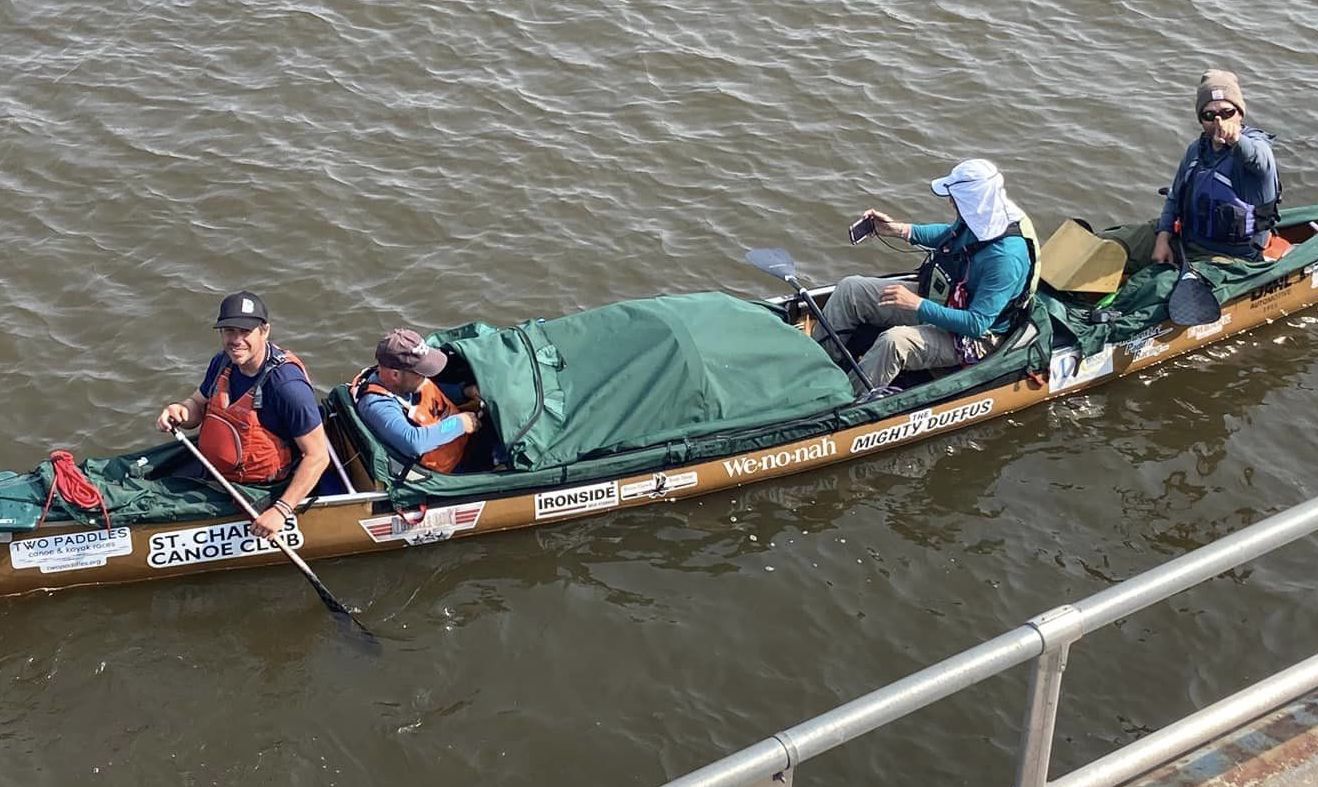Four men trying to break record for fastest time to canoe Mississippi River make it past Quincy

QUINCY — Many of us have strapped coolers onto canoes and traveled the Current River for a nice, leisurely float trip.
Imagine tackling the Mississippi River. Not a portion of it. The entire 2,350 miles.
Then doing it faster than anyone else.
A group of four paddlers entered the headwaters at Itasca State Park in Northern Minnesota on May 10. Their goal is to set the Guinness World Record for the fastest time to canoe the Mississippi by a team.
The group of four is comprised of:
- Scott Miller of Minneapolis, the leader of team “Mississippi Speed Record.” He has paddled more than 8,000 miles in his life.
- Judson Steinback, Lacrosse, Wis. He is the master’s class men’s and mixed United States Canoe Association C-2 national champion.
- Wally Werderich of Yorkville. He has competed in multiple United States Canoe Association national championships and many of the largest canoe races throughout the country.
- Paul Cox from Atlanta. He has more than 20 years of experience in ultra distance racing.
The quartet is not alone. They are a part of a team of roughly 35 members. Some in ground support drive along the river, providing additional food, drinks, laundry service and other needs as required. Others are in two boats escorting the travelers. A small group remains at home, handling behind the scenes work.
Todd Foster is the lead advisor for the Mississippi Speed Record team. He is based in Florida.
“Scott put this team together 20 months ago, almost two years before the attempt,” Foster said. “They were originally going to leave around May 4, but the ice was not out of some of the lakes up north, so they had to wait.”
Guinness started tracking this record in 1937. Three gentlemen made it from the headwaters to New Orleans in 57 days. The current record, set in 2021, sits at 17 days, 19 hours, and 46 minutes.
The team, which sits 25 hours ahead of the world record pace, passed by Quincy at 9 a.m. May 18. As of 5 a.m. Tuesday, May 24, the crew was at the LeTourneau Ramp in Vicksburg, Miss., with 1,897 miles paddled out of 2,334. They are ahead of world record pace by 24 hours and 9 minutes.
The team only stops at locks otherwise paddling 24/7. Two paddle in seats one and four while the other two rest in the center. All day. All night.
As for bathroom breaks …
“Seats two and three are modified so they turn into a commode much like a bedpan,” Foster said. That allows the group to stay on the water as much as they can.
“Imagine that every time somebody has to go to the bathroom, it takes eight minutes and there’s four of them. So that will eat up a lot of time if they have to pull over. They want to minimize that.”
Onboard restrooms with no shower or baths means … well, it stinks.
“They have planned wet wipe showers, and sometimes they’ll have hot water at their stops (at the locks),” Foster said. “They can use portable shower-like contraptions that they can step in for privacy.”
Seats two and three also are used for sleeping. The widest part of the canoe is in the very center. The group’s legs are basically touching and overlapping when they sleep.
Guinness provides approximately 16 pages of rules. The canoe must be commercially available but can be modified. The paddlers must keep a log tracking when they change positions. Specific electronic monitoring devices must be onboard, including a pinging device. Witnesses must document when they traverse through a lock. Portaging, the practice of carrying water craft or cargo over land, either around an obstacle in a river, or between two bodies of water, is not allowed.
Weather and barges are the biggest threat to an unsuccessful trip.
Jammed into a canoe, hour after hour, with three other men for almost three weeks can create delirium.
“Paddle sickness,” Foster acknowledges. “I once hallucinated that there was a bear with a leather jacket on a motorcycle. I was convinced that’s what I saw. These guys are running on empty. They’re physically exhausted. They’re mentally exhausted. Hallucinations happen.”
The trip is estimated to cost close to $50,000. They have sponsors and are asking for donations at www.mississippispeedrecord.com.
Zero sleep. The smell. Dirty clothes. Constant sun exposure. The soreness.
Why put yourself through this?
“Because it’s there. It’s that simple,” Foster says. “Because it’s there.”
Miss Clipping Out Stories to Save for Later?
Click the Purchase Story button below to order a print of this story. We will print it for you on matte photo paper to keep forever.

